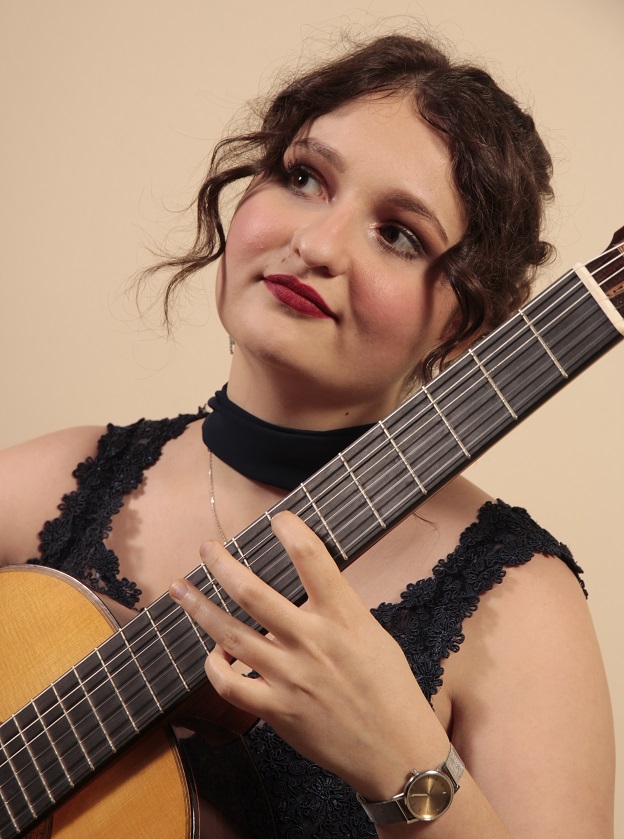Since 2018 Cassie Martin has traveled the world, won several awards, and participated in numerous festivals. Her repertoire combines early, contemporary and world music. As a Eurostrings artist in 2020, she took part in Gautier Capuçon’s Un été en France 2022 tour and then represented France in Sergio Assad’s The Woman and the Guitar project.
Your repertoire ranges from Bach to traditional world music: Brazilian, Austrian, Italian and French. Where do you want to go with your next project, be it on stage or on record?
I have a lot of plans. Of course, I’d like to continue introducing the public to the vast, little-known repertoire of the guitar, from the Baroque to the contemporary. One of my current concert programs is entitled La guitare à travers les siècles, in which I take the listener on a journey through time, showing all the facets of this beautiful instrument. I’ll soon have the opportunity to perform in China, Thailand, Argentina, Taiwan, Italy and other countries to share this musical wealth with an international audience.
As for my still secret recording project, it’s likely to be called RE-cital. I plan to explore the keys of D minor and D major, with a special emphasis on the works of Mario Castelnuovo-Tedesco, a composer I hold in high esteem and to whom I dedicated my master’s recital.
Can you tell us about your instrument, a guitar made by Daniel Friederich?
My guitar, made by the late luthier Daniel Friederich in 1994, is my traveling companion. It’s an extraordinary instrument that perfectly combines handcrafted quality with a rich, deep sound. Every time I pick it up, I feel a deep connection to it, and it’s thanks to its precision and sensitivity that I’m able to express myself fully as a musician. It’s a privilege to share a musical journey with such an extraordinary instrument.
 As a student at the CNSM de Paris in the class of Olivier Chassain, who will be retiring at the end of this academic year, you have naturally taken a stand against the reduction in guitar lessons that his non-replacement entails. Beyond the impact on this curriculum, what do you think this situation says about the place of your instrument in French conservatories and the prospects for guitarists of your generation?
As a student at the CNSM de Paris in the class of Olivier Chassain, who will be retiring at the end of this academic year, you have naturally taken a stand against the reduction in guitar lessons that his non-replacement entails. Beyond the impact on this curriculum, what do you think this situation says about the place of your instrument in French conservatories and the prospects for guitarists of your generation?
The reduction of guitar teaching hours at the CNSM de Paris following the retirement of Olivier Chassain is worrying because it reveals a broader challenge regarding the recognition and valorization of the guitar in French higher music education institutions. This situation highlights the challenges facing guitarists of my generation, particularly in terms of visibility, resources and learning opportunities. It’s crucial that institutions recognize the importance of the guitar and invest in its teaching to enable young guitarists to reach their full musical potential.
You’ve won numerous awards and international competitions that would take too long to mention in a few words. What are you personally looking for as a guitarist? And have you found it?
I’m always trying to explore new musical expressions and push artistic boundaries. International competitions and awards are a way for me to measure my progress, to share my passion with a wider audience and to perform more live; first prizes in competitions often lead to concerts. I have found these experiences to be a constant source of inspiration and a rewarding validation of my hard work.
You perform with orchestras for concerts, but also in chamber music formations as a guitar-violin duo. Can you tell us what this versatility brings to you?
The diversity of my musical practice is an extraordinary source of artistic enrichment. This diversity allows me to explore a wide range of styles, expressions, and repertoire, which feeds my creativity and provides a varied musical experience for both the audience and myself. In particular, playing in a guitar-violin formation with Camille Théveneau opens up new perspectives for the guitar, allowing it to flourish beyond its usual boundaries, especially by participating in classical music festivals, thus broadening its influence and offering an innovative listening experience to audiences unfamiliar with the guitar.
You’ve just won the ICMA Classeek Award. Can you explain your relationship with Classeek?
Classeek is a platform that I have been aware of for several years as it provides invaluable support to young classical musicians. I applied for the program and was selected as a finalist before being nominated for the ICMA award. Winning this award is a significant recognition of my efforts and reinforces my motivation to contribute to the world of classical music. It’s an extraordinary opportunity that opens new doors for the classical guitar and inspires me to continue my artistic journey with determination.
























